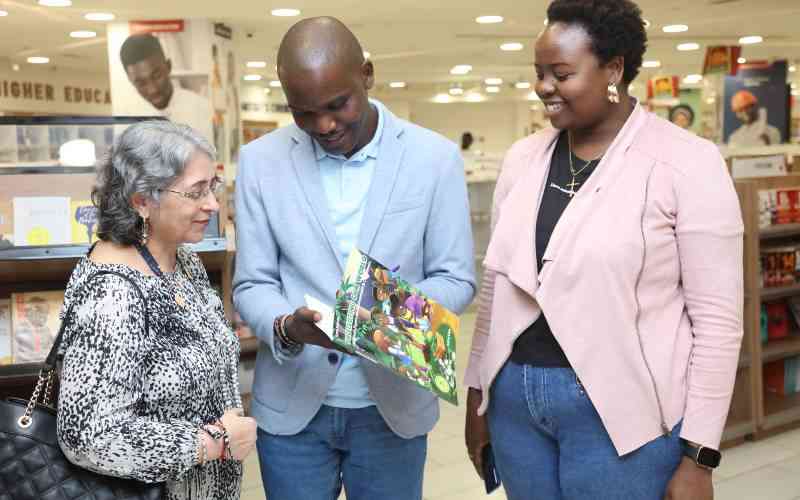
“What are you currently reading?” Was a question I flung at every single individual I met and spoke to on one single day and the answers were shocking.
One six-year-old daughter of a friend had the best response; “A storybook about a prince trying to save a princess from bad men...” (She had not finished her book yet. The rest of the responses were in the range of “Nothing” to “Eeeeh a motivational book by...I can’t remember” to “A lifestyle magazine.”
Only two individuals were reading novels. An African writer of repute and a Mzungu PhD student. The African writer was reading a work of fiction by a ‘fast rising young Indian sensation’ and the Mzungu lady a Meja Mwangi novel.
“There’s so much you can learn about a nation, her people, their cultures and ways from their literature,” the PHD student told me as her reason(s) for her interest in African literature. “This guy damn good. His sentences are like Mozart tunes,” the writer told me
Apart from these two individuals, the others from a lot in their mid twenties to early forties said they last read a novel way back in high school and only because it was mandatory in language classes.
Many reasons are given for this lack of interest in literature and especially African literature and most importantly Kenyan literature. It’s staid.
Narratives to overcome
According to one 35-year-old female lawyer whose collection of John Grisham novels is impressive, we (especially Kenyan writers) say the same stories with different titles. She explains that when we write about women – they are victims of something caused by men.
That they are victims of rape which results in a physical or mental disease of which she fights throughout our narratives to overcome. When we write about leaders, they are a bunch of pot-bellied, pompous, greedy, conniving, bald-headed old men whose sole purpose is to grab everything under the sun and above the ground.
When we write about youthful men, all we talk about is hopelessness which leads to a vice which in turn converts them to irritable pests of society in result they contribute majorly to the hapless state of affairs through our plots and sub-plots. That when we write about children, they are described as bare-chested, barefoot, skinny and starving.
And there is the village ageless madman who will pop up somewhere to add humour when giving preposterous answers to simple life questions as he hobnobs around a market place. This madcap will serve the purpose of injecting a smile or two to the suffering women as the kids mock him and toy around with him like he’s their agemate.
Limited Choice Of Words
She’s dismayed that when we talk about Kenya all our pens seem capable of yapping about is corruption, ethnic violence and stop right at the good old avenue of colonialism.
That all our trees are Acacias and lands hills and valleys dumbfounds her. Why all our water masses are blue except for the crystal clear rivers is yet another phenomenon.
Stay informed. Subscribe to our newsletter
And our vocabulary is the same limited choice of some forty odd words that we spin in different sequences as the chapters go. All other subjects are taboo except maybe for the round-bottomed, kitenge wearing matriarch.
In defence of this society of scribes of which I also belong to I argue that maybe she and her band of red wine sipping supporters have been reading the same author(s)from their childhood and school days hence the above mentioned ‘disparities’ just like their endless Grisham and McNab collections.
The responses are a mixed yes and no. Yes because they have heard of no new names. And no because the newbies sound just like their heroes...the legendary authors who they aspire and perspire to be like.
Except for a rare one or two poorly marketed penman whose works sit in the very far and hidden top corner shelves of one or two city bookshops that are not located in a mall.
‘Old boy networks’
This discussion has me thinking that maybe we the writing society (I’ll speak for Kenya only) are to blame. Maybe we are giving the masses raw mangoes and they are tired of the sour tastes and acidity we leave on their minds.
Maybe like in our narratives of domestic lives we have served the family ugali and sukuma day in and day out until they have started sneakily dining out in search of variety.
Maybe we are stuck in our very Kenyan habits of ‘old boy networks’ that we publish but just the few of our marketable peers over and over while in the words of one Tony Mochama “Lost the rest of the gifted crop to accounting”. Or maybe we are just a bunch of wannabes who think that the whole process is like our Secondary school forty minute essay writing sessions and feed publishers with salty notes worthy instead as an alternative to cattle fodder. Or maybe we a just a bunch of whiners and things are actually OK for those who truly put in effort. Or maybe it is true what is whispered in every aspiring and perspiring novelists ear, “Publishers don’t care”.
Whatever the ‘maybe’s’ are, it sure is time to feed the easy to please Kenyan masses as well as the rest of the world with nourishing words from our sweet scented and finger licking juicy pages.
 The Standard Group Plc is a
multi-media organization with investments in media platforms spanning newspaper
print operations, television, radio broadcasting, digital and online services. The
Standard Group is recognized as a leading multi-media house in Kenya with a key
influence in matters of national and international interest.
The Standard Group Plc is a
multi-media organization with investments in media platforms spanning newspaper
print operations, television, radio broadcasting, digital and online services. The
Standard Group is recognized as a leading multi-media house in Kenya with a key
influence in matters of national and international interest.
 The Standard Group Plc is a
multi-media organization with investments in media platforms spanning newspaper
print operations, television, radio broadcasting, digital and online services. The
Standard Group is recognized as a leading multi-media house in Kenya with a key
influence in matters of national and international interest.
The Standard Group Plc is a
multi-media organization with investments in media platforms spanning newspaper
print operations, television, radio broadcasting, digital and online services. The
Standard Group is recognized as a leading multi-media house in Kenya with a key
influence in matters of national and international interest.








